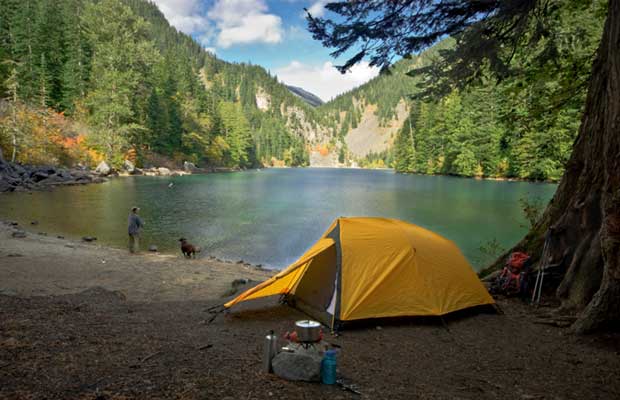Testing your survival system to see if it works is vital to ensuring it will perform as planned in an actual emergency or survival situation.
Camping gives you a great chance to test your skills as well as to hone your plan to its optimum effectiveness.
Here are a few things to consider when you are using your camping experience as a test for your survival plan.
1. Find out what works and what doesn’t – This is one of the big advantages in my opinion of practicing your bug out plans in this way. When I started building my bug out bag, I had a big list of items I needed and once I had them all, they were crammed into my military surplus bag. After walking around for a while with about 70 pounds of gear I quickly decided that I needed to drop a lot of weight from my bug out bag and that while the military surplus Alice pack was nice, it wasn’t the most comfortable thing in the world. Also, carrying that bag might make me a target a little more than someone who was just hiking with a regular bag in that someone might think I had a lot of supplies in there (prepper) instead of just some sweaty socks and camping gear. I also learned that in general I just had too much stuff. We packed too much food, that was too heavy and our clothing options were more than we needed. Lastly, I found a lighter water filter and all those things combined shaved a lot of weight off my pack and my shoulders.
2. Live Simply – Piggybacking on the item above, backpacking should give you a great excuse to live simply and to ignore all the extra clutter in our lives. What do I mean by clutter? I have seen a lot of bug out checklists that have so many extra things included that are ridiculous. Kindles or e-readers, coffee presses and a lot of unnecessary creature comforts. In this exercise, bugging out will be to save your life and your bug out bag should be packed with items that will help you live. It should not be packed with small inflatable boats unless your plan is to escape by water, camp chairs and portable fans. Keeping your bag to the essentials will make carrying it much easier. Instead of bringing a whole set of cookware and utensils, a simple pot and spoon might be all you really need.
3. Discover how everyone in your group reacts – One of my initial concerns with my family was how they would react to the wilderness and carrying their bags for three days so I tried to pay special attention to the weight they had and how they were faring on our hikes to new campsites. To my surprise, they all did amazingly well but that might not be the case with your family. By finding out who hates this whole exercise right now, you could save yourself some headache later when just going back to the car isn’t an option.
4. Adapt and reuse – One of the best ways to simplify your backpack or bug out bag and to reduce weight is to use items for more than one purpose or to reuse items for something different. One simple example is to have the water filter so you can refill water along your route or at your site as opposed to hiking it in. Clothing is another area that can be viewed in this way. On our trips, I would have one set of pants, not three but these are convertible so I can make them shorts if needed. One fleece, a hat, gloves spare underwear and thermals. The clothing lists changes with the seasons. You don’t need a change of clothes for every day. If the weather or your climate is relatively warm, a tarp will double as a shelter and weighs a lot less than a tent. It takes up much less room too. Paracord can be used as well as duct tape for a million uses.
5. Build your confidence – Lastly and I think the most important lesson you should take from backpacking is the confidence you will have to live in the woods for a while. This was most noticeable in my wife and kids. I was already fine with camping, but for my family this was all new and before we went, there were lots of questions and doubt. After our three days my family was not only happy with the experience, but were really impressed with how “not horrible” our time was. They had plenty to eat even though we had no kitchen table to sit around. They slept well even though their beds were on the ground and we all had a great time even when there was no traditional entertainment to be found. After our first trip my family was ready to bug out and even if that never happened, we had a great new activity to do for fun. Win Win.
Using any situation that is out of the ordinary as a way to test your survival plan is a good idea, but camping provides you with a perfect scenario to test just about every facet of your strategy.
In addition, it lets you assess how well your plans work and what you need to improve upon to make sure it is fail-safe if you every have to put it in action.
To see more tips on what you should cover when testing your survival plan during a camping trip, please visit The Prepper Dome.
